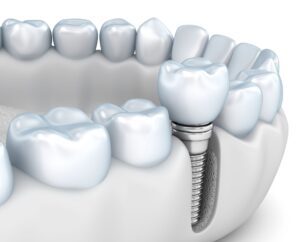Millions of individuals suffer from tooth loss and feel the effect on the look, function, and health of their smiles. Missing teeth may cause further oral health complications without treatment from a dentist. The jaw, in particular, can weaken if you do not seek tooth replacement treatment.
Your dentist can give you dental implants to rebuild your smile and prevent damage to your jaw. They can determine your eligibility for this solution when you schedule a consultation appointment. Read on to learn more about how tooth loss impacts jaw health and how implant dentistry and preserve your jawbone.

What Happens to the Jaw After Tooth Loss?
Healthy dental patients have teeth that extend below the gumline to reach the jaw. The tooth root stimulates the bone there, keeping it stable and strong. If a patient loses a tooth, the jawbone no longer receives stimulation. It deteriorates in the absence of the tooth root.
This may lead to the appearance of facial sagging as well as the shifting of remaining teeth in the mouth. The jawbone will continue to degrade without treatment from a dentist. This is why dentists encourage swift restorative dental treatment after tooth loss.
How Do Dental Implants Improve Jaw Health?
Many tooth replacement treatments will only restore missing teeth above the gumline. A dental implant features a titanium post anchor that a dentist surgically places into the jaw.
The anchor will ultimately support the prosthetic teeth of the implant. It supports this treatment by fusing to the jawbone. This stimulates the jawbone once again and stops it from deteriorating. This substitute for a missing tooth root will also encourage the regrowth of bone that has already been lost.
The treatment can therefore preserve the facial and dental structure as well as enhance it. Patients also appreciate that the implant will outlast many other treatments. With proper care, a dental implant will stay in place for twenty or more years.
Will My Jaw Sustain a Dental Implant?
Though dental implants offer extensive oral health benefits, not every patient can qualify for this treatment. An implant requires support from an anchor placed into the jaw. Therefore, you must retain enough healthy jawbone to sustain this anchor and then the prosthetic atop it.
If too much bone has been lost due to tooth loss, you might not be able to support a dental implant. Your dentist can check your jawbone structure and eligibility for this treatment through x-ray imaging taken during your consult.
The dentist may suggest creating more stability in the jaw with a bone graft. This surgery adds bone to a weakened jaw, making it stronger. It might be able to support a dental implant after it heals from this procedure.
If this treatment is not feasible, your dentist might recommend alternative tooth replacement options. Your dentist can discuss your unique medical history and which treatment will best work for you when you schedule a consultation.

